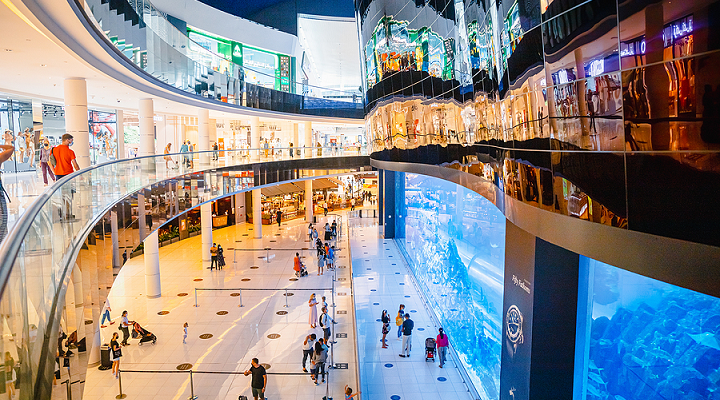Retailers have always been aware that their success relies on more than the product alone, and the retail store of today is no longer just a destination for in-person shopping. In our always-connected society, consumers are all the more demanding. They expect tailored content that aligns with their lifestyle, irrespective of location, preferred device or even time – placing greater strain on today’s stores. In the store of tomorrow, technology and innovation play a lead role in enhanci
ncing the customer experience and delivering improved outcomes. But without optimising the tools available or resetting strategy, retailers may struggle to remain successful in this new world. To adapt at the pace required, and against the challenges levied by inflationary pressures, an impending recession and an overall tough macroeconomic climate, these future-focused propositions will need to be smarter.
The new role of the physical store blends a dynamic, interactive hub for brand experiences, customer engagement, and product discovery. It goes beyond being a point of sale and becomes a destination that offers immersive experiences, blurring the online and offline realms.
Rethinking how retail interacts with its customers
Retailers’ physical locations should continue to support the consumer’s desire to experience and interact with the products, but in the same vein, online channels should be utilised to offer convenience and a more hyper-personalised experience. It can be as simple as customers being able to place and order from anywhere at any time.
Personalised promotions, digital payments, simplified returns and flexible delivery options all focus on an integrated customer experience, driven by a rich understanding of local customer data sources. It’s no longer about just making the sale, surviving in a tough climate means fostering more meaningful connections with consumers.
Membership models are one easy way to install rewards that enables brands to understand data on their consumers, while also offering loyal shoppers more value. Providing customised product recommendations via smartphones as shoppers walk around the store or empowering customers with personalised wayfinding are also integrated solutions that create a frictionless shopping experience. And this connectivity can in-turn benefit retail associates who can use real-time insights to deliver a personalised, data-driven sales experience.
Adopting a data-first mindset
Data is woven into every aspect of the store of tomorrow and it’s a critical tool to establish the online-offline model successfully. AI and machine learning can generate insights and inform decision-making that prioritises customer centricity; harnessing both internal and external data sources can create unified, accurate and accessible information for all functional leaders.
E-commerce fashion platform The Iconic, for example, leverages machine learning and various technologies to enhance customer satisfaction. These innovations encompass forecasting delivery timelines and the platform is beginning to use data to understand customers fashion preferences, to help suggest full outfits.
To optimise this data, retailers must establish a culture of data literacy that enables employees to effectively gather, process, analyse, and act on insights. By leveraging purpose-built data and AI solutions, retailers can gain access to proven use cases in marketing, supply chain, and merchandising. Employees can then make prescriptive recommendations that enhance operational effectiveness and drive better business outcomes.
Through modern cloud technology, AI, machine learning and enhanced data analytics, retailers can achieve greater automation and drive operational efficiencies. This transformation can then empower retailers to optimise their supply chains at the local level, allowing for a sharper focus on market dynamics at regional, community or individual customer levels. Ultimately, creating more value and satisfaction for the consumer.
Supporting an agile workforce
People remain a core ingredient to the success of retail business. Investing in your workforce now can prime your business for how well you weather a tough climate. Where many businesses’ first instinct is to cut on these frontline costs, having a workforce that is diverse, adaptable and equipped with future-focused skills is crucial to thrive in this economy.
High-performing staff will create more value for the business and in-turn reap more value and satisfaction out of their roles. This type of investment can also differentiate the business as an employer of choice in a competitive market and empower employees by enhancing productivity and connectedness.
Think about how retail staff’s role can be diversified to encompass more aspects of the business. They may be a product superstar on the shop floor, so let them shine online. Small businesses can thrive from this type of connected experience where their retail experts can host product demonstrations or information sessions on their online channels, reaching their consumers through different touchpoints.
“Walk out technology” such as the likes seen in Amazon Fresh stores, has proved to be an optimal frictionless shopping experience and is slowly beginning to be implemented in other retail scenarios. While this type of technology is largely touted as being convenient for the customers, by bypassing the need for queuing to pay, staff usually placed as cashiers can have their time freed up to focus on the roles that drive more value.
So, how can traditional retailers adapt?
If we learned one thing from the pandemic, it is that technology creates agile businesses who can survive through challenging circumstances. Having the right technology is fundamental to power the store of tomorrow and the beauty of the concept is how it drives a more connected and personalised customer journey in a seamless way.
The jury’s out whether e-commerce will completely dominate the retail landscape, but by embracing these strategies, retailers can position themselves for success and weather any challenges like an impending recession or inflationary pressures.

